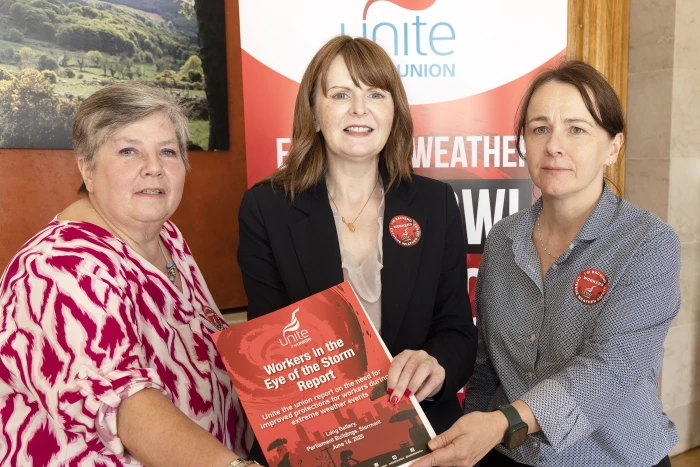

In September 2019, during Storm Ali, Unite member and engineer Matthew Campbell was killed by a falling tree after being sent to work in Slieve Gullion forest.
In January of this year, two-thirds of Unite members who had to work outdoors during Storm Éowyn did not feel that their employer had taken all reasonable precautions to make work safe.
Despite growing evidence that the climate crisis is driving increased intensity and frequency of extreme weather events, our health and safety legislation dates back decades and has failed to keep up with the science.
Following Storm Eowyn in January, Unite surveyed our members on their experiences – and the results were very worrying.
Nearly a quarter of those who responded to our survey said their employer did not provide timely information on closure, working-from-home or payment arrangements.
Of those not required to work on the day of the storm, a quarter were told to take the day as annual leave, sick leave or time-off-in-lieu, while others had to extend their shifts without compensation to avoid travelling during the storm. Essentially, workers were being asked to pick up the tab for storm-related closures or shift adjustments
Of those who went to work on the day of the storm, almost three quarters said they did not feel safe.
Grim as these survey findings are, they understate the challenges faced by workers because the survey was confined to Unite members who enjoy the ‘union safety premium.’ Unionised workplaces with union-trained health and safety representatives are safer workplaces.
In fact, Unite and our shop stewards intervened repeatedly to ensure our members were safe and paid as usual during Storm Éowyn and its aftermath.
Workers in non-unionised workplaces are even more exposed to extreme weather risks.
Strong health and safety legislation protects all workers, but the most vulnerable workers benefit the most.
In June, in Stormont’s Long Gallery, Unite launched our proposals to keep workers safe during extreme weather events.

Gaye Partridge, Chair of Unite's Regional Women’s Committee; Minister for the Economy, Caoimhe Archibald; Susan Fitzgerald, Unite Regional Secretary.
The event was sponsored by MLAs from the two largest parties and addressed by Economy Minister Caoimhe Archibald. We are currently preparing to engage in round table discussions with the department, the health and safety executive and employers on the legislative and wider policy changes needed.
There is a growing political realisation that workers will not tolerate being asked to pay the price – in terms of their safety or their pockets – for a climate crisis not of their making. Now we need that realisation to be translated into concrete action.
Unite’s proposals aim to create a science-based health and safety framework to protect all workers from the impact of extreme weather events while also ensuring that they are properly supported and are not out-of-pocket. Our proposals include:
Mandatory ‘extreme weather’ risk assessments and alert-dependent closures, with non-essential outdoor work ceasing during amber alerts and all non-essential work ceasing during ‘red’ alerts.
Statutory maximum working temperatures depending on the type of work and working environment.
An explicit prohibition on any attempts to make workers’ pay for weather-related closures by insisting that they take the time as unpaid leave or similar.
Climate leave modelled on measures adopted in Spain following last year’s devastating Valencia floods allowing workers to access up to four days’ paid climate leave if extreme weather makes it impossible to travel to and from work, or they need to address urgent weather-related domestic needs. After four days, companies should be able to access government supports as part of a package of temporary suspension measures.
Robust legislation requires robust and transparent enforcement. That means explicitly tasking the Health and Safety Executive for Northern Ireland with enforcing relevant legislation and holding employers to account. All workplace accident investigation findings should be disclosed to survivors, victims’ families and their trade unions. And we need to ensure that workers have confidence in the HSENI, which is why three seats on the HSENI board should be reserved for trade unions, and provision made for ‘roving’ trade union health and safety inspectors with a right of workplace access.
We have a chance to climate-proof our health and safety legislation.
It’s now time to work together and ensure that Northern Ireland sets the standard when it comes to protecting workers from the impact of extreme weather events.
Susan Fitzgerald, Regional Secretary, Unite the union.
Pivotal Platform is a home for guest writers to contribute their perspectives on public policy debates in Northern Ireland. The views expressed by guest writers are not necessarily those of Pivotal.





